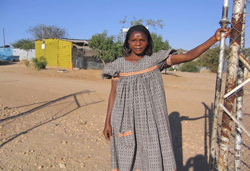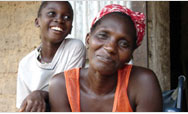You are here » Home » Telling Our Story
Case Study
Preventing mother-to-child transmission of HIV/AIDS
Keeping Infants Free of HIV/AIDS

| |
Photo: Social Marketing Association/Eric Williams
|
|
Celia visiting the New Start Center in Katutura.
In collaboration with the President’s Emergency Plan for AIDS Relief, USAID has helped fund 16 “New Start Centers” where 40,000 Namibians have received HIV/AIDS testing and counseling services.
|
Challenge
In Namibia, approximately one in five pregnant women are HIV positive. Of those, one in three will pass HIV onto their child through pregnancy, childbirth, or breastfeeding. For pregnant women, HIV infection can be devastating for both mother and child. Living in an informal settlement on the outskirts of Katutura, Celia stands at a crossroads in her life. At age 30, she is pregnant, unemployed, unmarried, and without any financial resources. Encouraged by her sister to go for a free HIV test, Celia visited a USAID-funded New Start Center, which offers HIV counseling and testing services.
Initiative
USAID is helping fund New Start Centers where women can test for HIV and mothers-to-be can learn how to prevent transmission to their children. Advances in drug therapy have cut the risk of mother-to-child transmission during delivery in half, and the centers provide access to these therapies. USAID launched radio and television campaigns to educate Namibians about the centers and about the importance of getting tested.
Results
After undergoing pre-test counseling, Celia received a test and was found to be HIV negative. She was encouraged to return in 90 days for a follow-up test. Upon her return, she will learn more about ways to prevent HIV infection in the future. Women who test positive are referred to a local hospital where they obtain comprehensive services, including counseling and medications to help reduce the risk of mother-to-child infection and to help the mother maintain a stable health profile after giving birth. In addition, women can enroll in one of the many support groups throughout the country for people living with HIV. Since the program began, over 40,000 people have been counseled and tested at 16 New Start Centers throughout Namibia.
Print-friendly version of this page (408kb - PDF)
Click here for high-res photo
Back to Top ^ | 

